Evangelicals

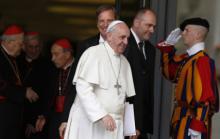
When evangelicals and Catholics set aside centuries of mutual suspicion 20 years ago, the idea was fairly simple: Even if we can’t always work together, at least let’s not work against each other.
Now, two decades after the launch of the group Evangelicals and Catholics Together , relations between the two groups appear stronger than ever, forged by shared battles over abortion, same-sex marriage, religious freedom, and immigration.
A new pope is finding crossover appeal among evangelicals who share Pope Francis’ emphasis on evangelism and his distaste for the fancier trappings and authoritarianism of the papacy.

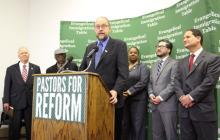
WASHINGTON — Trying yet again with new voices, more than 250 evangelical pastors came to Capitol Hill on Tuesday to push for immigration reform.
“I didn’t want people to think this was only a Hispanic issue,” said Eugene Cho, pastor of Quest Church in Seattle, at a news conference before meeting with dozens of mostly Republican members of Congress. “This is impacting a lot of people, including Asian-Americans.”
Cho, who is of Korean descent, was among the new faces demonstrating support for immigration reform across racial and ethnic groups and denominations. He pointed out that one out of five Korean-Americans are undocumented.

When facing a crisis, silence is certainly easiest. But silence isn’t best. As we face some very challenging environmental issues, evangelicals must learn to begin to discuss the environmental crisis with creativity and integrity. Whether it’s because we know we play an integral role in the healing of the world, in agreement with Wendell Berry, who says our fate is “mingled in the fate of the world.” Or, because we’ve come to see our responsibility to care for God’s creation as a central aspect of our love of Jesus Christ. Regardless of our reason — silence can’t be our policy.
In a very real sense, the easiest way for us to deal with the realities of the 21st century ecological crisis is practicing a kind of mutual pretense. That’s the easiest thing to do. Despite the humming knowledge that hard things await, we will talk about anything without actually talking about what is going on. More than many, I know that this can be the practice of evangelical Christianity in which I am rooted. We’ll talk about the return of Jesus, about theology, about church practice, anything but what’s actually going on in our world.

If you think it’s impossible to change evangelicals’ views on climate change, think again.


IN 2013, Sojourners commissioned a messaging study to contribute to the creation care movement—the Christian response to climate change. We polled nearly 1,100 people, oversampling for evangelical Christians, since evangelicals can be politically effective when activated on justice issues, as they have been on immigration, HIV/AIDS, and human trafficking.
Our goal was not only to learn evangelicals’ attitudes about climate change, but also to explore which messages are most compelling so we can better communicate on the issue and make an effective difference for God’s creation.
The first thing we learned was that many of the common stereotypes about evangelicals and climate change simply aren’t true. For one thing, the majority of evangelicals we surveyed (60 percent) agree that climate change is happening, and most say that human activity plays a role.
Second, one’s position on climate change is better predicted by political affiliation than by religion but, interestingly, evangelical Republicans are more likely to support action on climate change than non-evangelical Republicans. Young evangelicals are also more receptive to climate change messages than non-evangelical young people. And for those who don’t agree with us on climate change, there is a low level of certainty: Twenty-five percent of evangelicals are in the moveable middle, either “somewhat sure” that climate change isn’t happening or undecided. This means there’s a good chance that they already care, or that their opinion could be changed.

“GOD CREATED the world and we created borders.”
That obvious recognition was shared at a recent consultation in Quito, Ecuador, between North American and Latin American churches on “Faith, Economy, and Migration.” Felipe Adolf, president of the Latin American Council of Churches, shared that conclusion on how issues of migration and reform are global and not just local.
It’s very easy to see the problems confronting our nation and feel as though the challenges facing the rest of the world are simply too much to bear. Continuing poverty and unemployment, discrimination of all kinds, and wars and rumors of wars fill our newsfeeds, papers, and TV screens. But it’s naïve and narrow to think this way. Many of the threats we face are global in nature and don’t know any boundaries. Through our economies and consumption habits, media, travels and migrations, and for Christians in particular our faith, we are inextricably connected with men and women around the world. It’s always been important, but now especially so, to think globally when it comes to faith and justice.
Sojourners has a long history of doing this very thing. We started as a little group of two kinds of people—those who had grown up conservative evangelicals and were deeply frustrated with the lack of attention to issues of justice and peace, and those who had just come to faith from the student movements and counterculture of the 1960s and ’70s. We met at Trinity Evangelical Divinity School and began to study and pray through the scriptures about injustice, war, and poverty. The Vietnam War was raging, and we were looking for a biblical understanding of the events of our time.
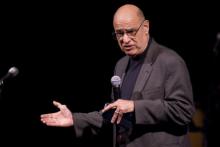
Tony Campolo, a progressive evangelical leader who counseled President Bill Clinton through the Monica Lewinsky scandal, announced that the organization he founded nearly 40 years ago will close on June 30.
Campolo, 78, plans to retire with the closure of the Evangelical Association for the Promotion of Education, but he will continue to write and speak, with nearly 200 engagements scheduled for 2014. He said his health is fine and he wants to write one more book on how Christianity fits with the social sciences.
By June, Campolo said he anticipates there will be about $300,000 left to distribute to the off-shoot ministries started by the larger EAPE. The 22 ministries that were started under EAPE now operate independently and will continue, including Red Letter Christians, where Campolo plans to spend most of his time.

Pope Francis on Tuesday released his first apostolic exhortation since his election in March. The message, “Evangelii Gaudium” (“The Joy of the Gospel”), challenges Catholics — both laity and clergy — to pay more attention to evangelizing the world.
While most American evangelicals do not usually read papal pronouncements, it would be a shame if we did not familiarize ourselves with Francis’ newest document, for there is much in it that evangelicals could embrace:

In the Hebrew and Christian scriptures, there is a Psalm that proclaims: “the earth is the Lord’s and everything in it, the world, and all who live in it” (Psalm 24:1). There is no part of this world that God is not aware of, cannot lay claim to, and does not rule. Christians affirm that as people of faith we’re called to be stewards over creation, answering one day for how we’ve treated the earth.
And part of that stewardship means understanding how this world works and what it needs in order to thrive. Unfortunately the din of our political ideologies has too often drowned out the biblical calling to care for creation.
In Texas, the State Board of Education will recommend new textbooks for all its students—and because it has such a large population, what they decide could determine what students in other states learn about science. There are several ideologues submitting textbook critiques to the board and their reviews will factor into each book’s overall score and likelihood of being approved by the school board. These ideologues could block the use of textbooks that teach the reality of climate change for the whole country’s public school students.

There’s a debate happening on The Christian Post, and we’re hearing more and more evangelical voices expressing concern over climate change.
Over the summer, talk radio pundit Rush Limbaugh made a comment about people believing in God and manmade global warming: he said it was “intellectually impossible.” It is not, of course, impossible to have faith in God and to agree with 97 percent of scientists that we are harming God’s creation with climate change. And in response to Rush’s comments, Sojourners sent Mr. Limbaugh a letter signed by more than 9,000 people of faith asking him to correct the record (which he has not yet done).
But Rush Limbaugh’s comments also sparked a conversation on the popular evangelical website, The Christian Post. Two prominent climate scientists who are also evangelical Christians, Dr. Katharine Hayhoe and Dr. Tom Ackerman, responded to Rush in an open letter on site. They told Rush that, contrary to his assumptions, they are compelled to work in their field by both their faith in God and their expertise in atmospheric science.

The couple practiced Candomble, an African-Brazilian faith with roots in Brazil’s slave trade.
They dressed in white and believed in an all-powerful God who is served by lesser deities, blending Catholicism with African spiritualism, or the belief that the dead communicate with the living.
But their neighbor, who attended a local evangelical church, disapproved. On a balmy day one year ago he shot and killed the husband as he was screwing in a light bulb in his yard.
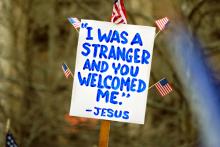
Evangelicals around the country are praying for Congress to bring fair and just immigration reform to a vote. Often, advocates within the Christian community voice concern for the “least of these” — the unauthorized immigrants who are living in the shadows. But churches shouldn’t view Congress’ critical immigration decision as simply a matter of compassion for the “other;” immigration might be the lifeline that American Christianity needs.
Much has been written about the way that growing numbers of “millennials” are walking away from the church. The music, programming, and even vocabulary of many Christian churches seems aimed at solving the puzzle of how to keep young people interested in faith and keep them sitting in the pews. Yet while it seems millennials are walking out the front door of U.S. congregations, another group is knocking at the back door: immigrant Christians.

Every so often a fiction book makes a splash in the swamp of Christian literature, which is predominately ruled by non-fiction reads. The Shack by Wm. Paul Young would be one modern example and, reaching back just a bit more, In His Steps by Charles M. Sheldon would be another.
It's happened again.
Frank Schaeffer's And God Said, “Billy!” is a work of Christian fiction that just barely fits into the “Christian” sub-category of fiction. That's not to say it doesn't come with a heavy dose of Christian characters and culture (it does) as much as it is to say, unlike the other must-read fictions of the past that I just mentioned, this book could and should have a much broader appeal. So much so, I almost titled this review, “The Book Everyone Needs to Read ...”.
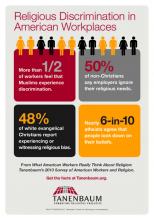
The American workplace, like the rest of U.S. society, is becoming more religiously diverse and that is raising concerns about employer accommodations for believers — and increasing the odds for uncomfortable moments around the water cooler.
Yet one potential flashpoint among workers does not involve new immigrant faiths but rather two indigenous communities: white evangelicals and unaffiliated Americans who constitute one of the fastest-growing segments of the population.
A major factor contributing to workplace conflict, according to a survey released on Friday, is that evangelicals — whose religious identity is tied to sharing their beliefs — are much more likely to talk about their faith at work than other religious and nonreligious groups.
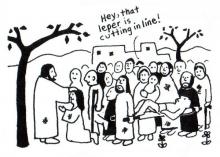
I have to say, one of my very favorite things about Jesus is how he does whatever he wants to and could really give a hell about how other people feel about it. Yeah. I just find that endearing — especially when he irritates the nice religious people. That’s secretly my favorite.
In our Gospel text for today Jesus is teaching in the synagogue on a Sabbath when he sees a woman with a crippled back. He saw her, called her over and said “Woman you are set free from your ailment.” He reached out and touched her and she stood upright for the first time in 18 years and praised God — which seems like a win. Except for that then the leader of the synagogue throws a little tizzy about how that kind of thing should not be happening on the Sabbath. Further proof that super religious people can just be so helpful, can’t they?
Especially when they seem to value parameters over people – which should sound like a familiar story …
Stories of churches denying your call to ministry because you fall outside the parameters of which gender is allowed to be ordained and stories of churches denying you the Eucharist because you fall outside the parameters of what kind of sexual orientation is allowed to receive the means of grace and stories of churches denying you a place in community because you just weren’t sure if you believed in God and that falls outside the parameters of doctrinal purity – well, these kind of stories are sadly bordering on cliché around here. We hear them all the time.

A new voice is emerging in the evangelical community, and it’s turning away from the church’s vocal opposition to homosexuality in favor of a more tolerant attitude.
Researchers at Baylor University found that 24 percent of evangelicals were “ambivalent,” meaning they support civil unions or legal recognition of gay relationships, despite harboring a moral opposition to homosexuality.
“What you have is this increase in people coming out publicly and saying, ‘I don’t want to be a part of this anti-gay rights movement as an evangelical,’” said Lydia Bean, assistant professor of sociology at Baylor and co-author of the study.
The study, “How the Messy Middle Finds a Voice: Evangelicals and Structured Ambivalence towards Gays and Lesbians,” analyzed national data from the 2010 Baylor Religion Survey, conducted by Gallup.